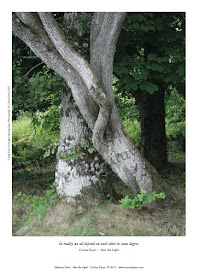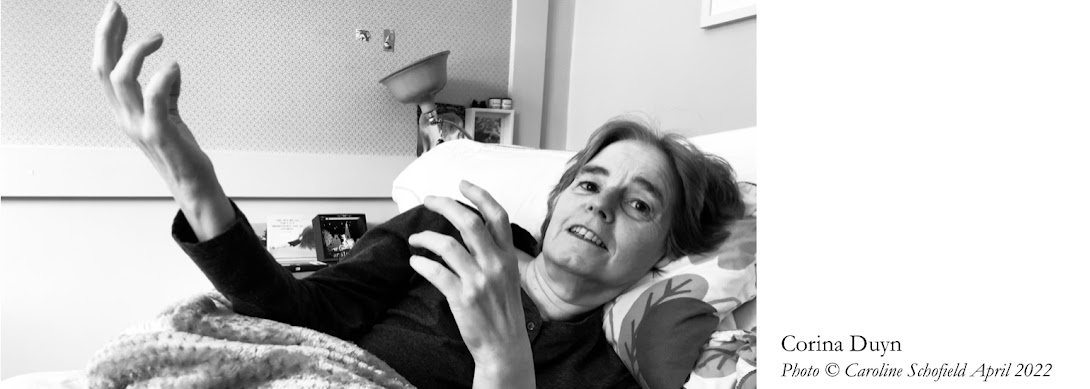Illness brings a level of dependency which can be very challenging to accept. But maybe we are all dependent on each other to some degree...
Illness brings a level of dependency which can be very challenging to accept. But maybe we are all dependent on each other to some degree...
"These trees in your photo remind me how the trees can teach us in quiet ways the timeless wisdom of waiting, enduring, drawing strength from others (which we often seem to find so difficult to do!) and finding hope for springtime and the future."
| Joyce Barrass |
 |
'The Oak tree is the emblem of strength and hospitality.'Kathleen Madge - The World of Living Green.Print from the Into the Light series |
At the edge of Annaghmakerrig Lake a young hawthorn tree had grown leaning against a much older and stronger oak tree. It was as if it needed support to grow. To survive.
It made me think about dependency, about asking for help. Accepting support.
Cheri Register contemplates in her book Living with Chronic Illness: ‘Asking for help is, first off, an admission of helplessness’.
I certainly have struggled with dependency for the duration of this illness. I can still find it difficult to ask for help.
I am resourceful.
Make changes, re-think if it really needs to be done; divide up the task over a longer period...
At times I simply have to ask for help.
No matter how sophisticated the intellectual acceptance of illness is, it stays emotionally difficult to say, I can no longer live without support.
Susan Alm puts it clearly: 'It is very frustrating when you can’t pick up a spoon or stir a pot of soup. When you have to have someone come in and do the simplest, very basic things for you, it is very difficult thing to deal with. And it is difficult not just because your life is disrupted by having another person there, but because it's admitting that you can’t take care of yourself.'
So, What does independence really mean?
'Independence', suggest Jenny Morris in her excellent book on disability studies, Pride Against Prejudice, that 'to the non–disabled world the term is used in a specific ideological contexts; it means both physical and emotional autonomy and the focus is on the individual's ability to achieve this autonomy. When you can’t carry out these tasks you become in a sense helpless and subordinate - independence is assumed to be impossible.' Simon Brisenden refines independence further: 'The disabled are victims of this ideology of independence. It teaches us that unless we can do everything for ourselves we cannot take our place in society.'
Now that made me think.
It can be argued that my place in society is that of an artist and writer who conveys a message about living with the challenges of chronic illness/disability, through words and images. In order for me to do this at the best of my ability, I need assistance.
I realize that my dependency is not necessarily one-way. Maybe it's more a case of inter-dependence. I need somebody. Somebody might need me; maybe to earn a living, or to learn from my creative work.
This thought takes the pressure off ‘needs’, and as Cheri Register suggests, 'If we are allowed to retain control, we can accept offers of help without feeling's diminished by our dependence on others'.
Bonnie Klein, who wrote about her stroke puts a practical spin on independence. 'I no longer see independence in terms of how far I can walk, as I did in physio, but as control of my life, measured not by the tasks I can do without help but with the quality of my life with the help that is needed.'
That, to my mind, is very powerful indeed.
The focus is on the quality of life, needs be with support.
To bring this to an even more human level, she suggests, 'Maybe independence is a misleading concept. Each of us is dependent on others. Perhaps independence is not the ultimate goal, but interdependence: the possibility of doing with and for each other, the ability to ask for help with what each needs.'
Or as Sister Stanislaus Kennedy puts it beautifully that all of us have unique gifts. 'We live better when we share in the presence and talents of others…'
Maybe we are both the Oak Tree and the Hawthorn.
Links:
- This story was the one of the starting points for what came to be my Into the Light book in a box, which consists of a set of images, and short quotes.
- The image is one of the A4 prints available here
- Joyce Barrass who instigated me to write about this image, has her photos here and Blog
- Quotes are from: Kathleen Madge, The World of Living Green 1947, London and Redhill Lutterworth Press page 16; Cheri Register. Living with chronic illness, page 73, Susan Alm. Quoted by Register Page 36; Jenny Morris, Pride Against Prejudice: Transforming Attitudes to Disability. Women’s Press 1996. page 13 & Morris, quoting Simon Brisenden, page 140; Cherri Register. Living with Chronic Illness, Bantam Books, 1992, Page 59; Bonnie Sherr Klein, Slow Dance A story of Stroke, Love and Disability, PageMills Press Berkeley, 1998, page 220 & 278
Sister Stanislaus Kennedy, Gardening the Soul – A spiritual daybook through the seasons. Simon & Schuster/Townhouse, 2001, page: 5 June See Also HERE

No comments:
Post a Comment
It is always so lovely to hear from my readers.
Thank you for stopping by and leaving a comment.
With every best wish
Corina